French actress Simone Signoret (1921-1985) was given the ‘star build-up’ in the postwar years, and in the following decades she developed into one of the grand legends of the French cinema. Signoret won three times a BAFTA Award, an Oscar, an Emmy, a Silver Bear at the Berlin Festival, a Golden Palm at the Cannes Festival, and many, many more awards.
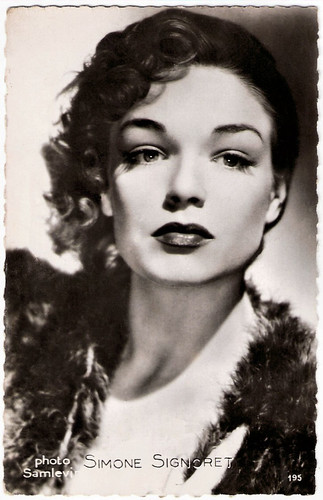
French postcard by Editions P.I., Paris, no. 195. Publicity card for Les carbones Korès. Photo: Sam Lévin.
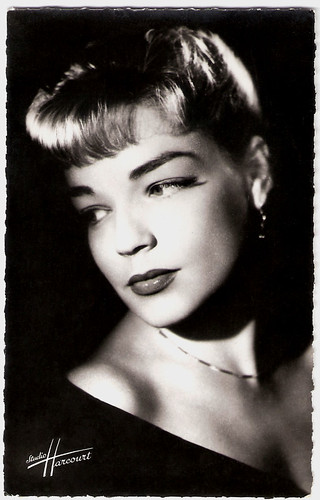
French postcard by Editions du Globe, Paris. Photo: Studio Harcourt.
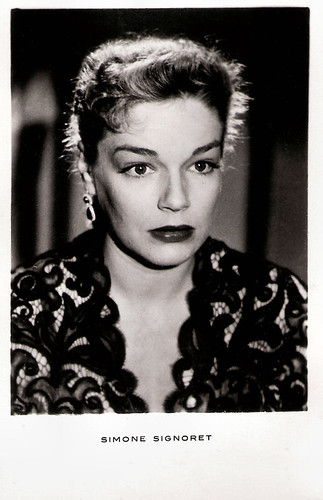
Vintage postcard. Photo: publicity still for Ombre et lumière/Shadow and Light (Henri Calef, 1951).
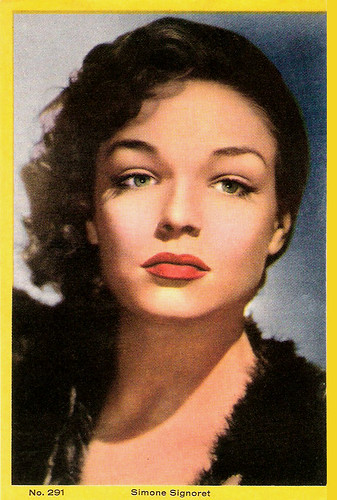
Mexican postcard, no. 291. Photo: Sam Lévin.
Simone Signoret was born Simone Henriette Charlotte Kaminker in Wiesbaden, Germany, in 1921. Her father, André Kaminker, a pioneering interpreter who worked in the League of Nations, was a French-born Jewish army officer of Polish descent, who brought the family to Neuilly-sur-Seine on the outskirts of Paris. He and his French wife Georgette Kaminker-Signoret, had also two younger sons, Alain and Jean-Pierre.
Simone grew up in Paris in an intellectual atmosphere and studied the English language in school, earning a teaching certificate. She tutored English and Latin and worked part-time as a typist for a French collaborationist newspaper, Les nouveaux temps, run by Jean Luchaire.
During the German occupation of France, Signoret mixed with an artistic group of writers and actors who met at a cafe in the Saint-Germain-des-Prés quarter, Café de Flore. By this time, she had developed an interest in acting and was encouraged by her friends, including her lover, Daniel Gélin, to follow her ambition.
In 1942, she began appearing in bit parts, making her film debut in Le Prince charmant/Prince Charming (Jean Boyer, 1942). She was working without an official permit during the Nazi occupation of France, because her patriotic father, who had fled to England in 1940 to join General De Gaulle there, was Jewish.
Working almost all the time, she was able to earn enough money to support her mother and two brothers. For the cinema she took her mother's maiden name, Signoret, to help hide her Jewish roots for the Nazi authorities. She had a long film apprenticeship during World War II, mostly as an extra and occasionally getting to speak a single line.
Through the auspices of her first husband, director Yves Allégret, Signoret was given the ‘star build-up’ in the postwar years. Her husband directed her in Dédée d'Anvers/Woman of Antwerp (Yves Allégret, 1948), as Dédée, a prostitute who finds true love. In 1949 she left her husband for actor-singer Yves Montand, whom she married in 1951 and with whom she lived until her death.
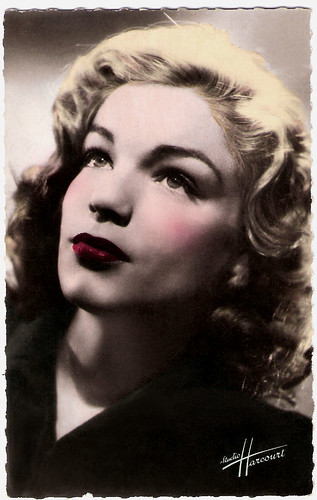
French postcard by Editions O.P., no. 19. Photo: Studio Harcourt.
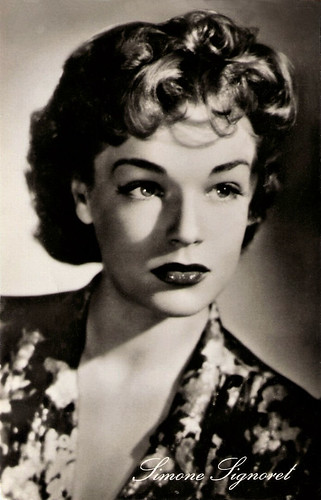
German postcard by VEB Progress Film-Vertrieb, Berlin, no. 820.
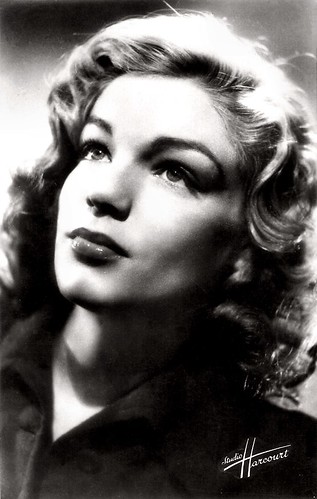
French postcard by Editions O.P., Paris, no. 19. Photo: Studio Harcourt.
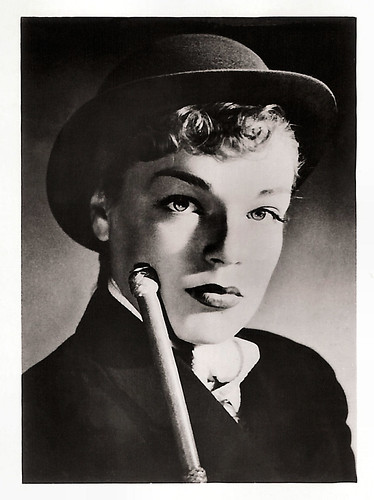
German collectors card by Greiling Sammelbilder in the series Filmstars der Welt, 2. Band, Serie E, no. 97. Photo: Allianz Film. Publicity still for Manèges/The Cheat (Yves Allégret, 1950).

Vintage collectors card, no. A 55. Photo: publicity still for Manèges/The Cheat (Yves Allégret, 1950).
"The young Simone Signoret radiated beauty and a ripe sensuality which glowed tangibly from the screen", writes Philip Kemp at Film Reference: "She moved with the indolent languor of a woman supremely confident in her own powers of attraction; the slow, sleepy smile and the heavy-lidded eyes irresistibly evoked thoughts of warm bedrooms and summer meadows. Inevitably, she was cast time and again as a prostitute, a profession amply represented in the postwar French cinema."
An example is her role opposite Gérard Philipe in La Ronde/Round (Max Ophüls, 1950), a film which was banned briefly in New York as immoral. One of the best of her unlucky-in-love characterisations was as the title figure in Casque d'or/Golden Helmet (Jacques Becker, 1952), for which she won a BAFTA Film Award.
Other notable French films in which Signoret appeared during the 1950s are the Emile Zola adaptation Thérèse Raquin/The Adulteress (Marcel Carné, 1953) with Raf Vallone, Le mort en ce jardin/Death in the Garden (Luis Buñuel, 1956) with Charles Vanel, and Les Sorcières de Salem/The Witches of Salem (Raymond Rouleau, 1956) based on Arthur Miller's play.
A Signoret film that is shown often on TV is the thriller Les diaboliques/Diabolique (Henri-Georges Clouzot, 1955) with Véra Clouzot and Paul Meurisse. The chilly character Signoret plays was proof of her immense acting ability.
Philip Kemp at Film Reference: "As a murderess, she could be both credible and sympathetic: as one of Zola's pair of guilt-ridden lovers in Thérèse Raquin, or as the seemingly vulnerable yet scheming blond bomb-shell accomplice in the homicidal labyrinth of Clouzot's Les Diaboliques, the role that cemented her international renown and became an archetype thereafter in imitation upon ripoff of the Boileau-Narcejac thriller, including three remakes with Tuesday Weld, Kate Vernon, and, most recently, Sharon Stone filling Signoret's shoes."
Hollywood beckoned throughout the 1950s, but both Signoret and Yves Montand, were refused visas to enter the United States. Their progressive political activities did not sit well with the McCarthy-era mentality in the US at the time.
Her breakthrough to international stardom came at the age of 38 with the British film Room at the Top (Jack Clayton, 1959) opposite Laurence Harvey. She won an Academy Award for her portrayal of Alice Aisgill, an unhappily married woman who hopes she has found true love. She radiated real warmth in all of her scenes.
Later she played in England again opposite Laurence Olivier in Term of Trial (Peter Glenville, 1962), and in America with Vivien Leigh in Ship of Fools (Stanley Kramer, 1965), which earned her another Oscar nomination.
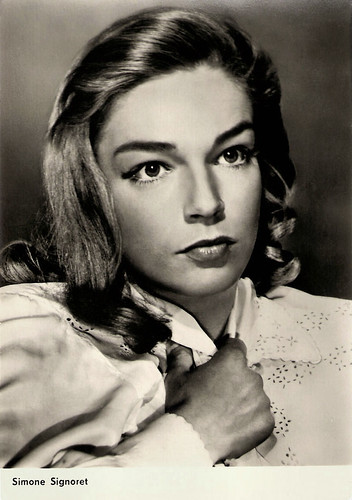
East-German postcard by VEB Progress Film-Vertrieb, no. 1924. Photo: publicity still for Thérèse Raquin/The Adultress (Marcel Carné, 1953).

East-German postcard by VEB Progress Film-Vertrieb, Berlin, no. 1925. Retail price: 0,20 DM. Photo: publicity still for Thérèse Raquin/The Adultress (Marcel Carné, 1953) with Raf Vallone.
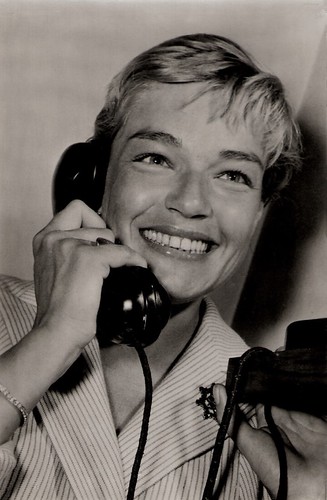
East-German postcard by VEB Progress Film-Vertrieb, Berlin, no. 147. Photo: Gerhard Puhlmann. Simone Signoret then played in the coproduction of Films Borderie, Paris, and DEFA, Berlin, Les sorcières de Salem/The Witches of Salem (Raymond Rouleau, 1956).
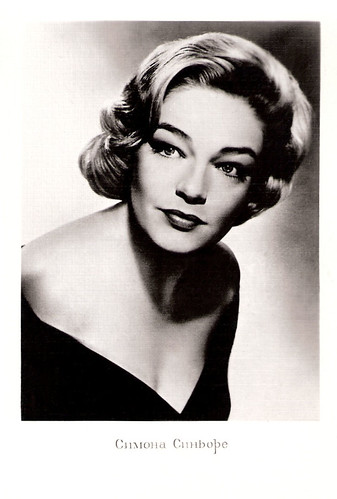
Russian postcard, 1961. Retail price: 8 Kop.
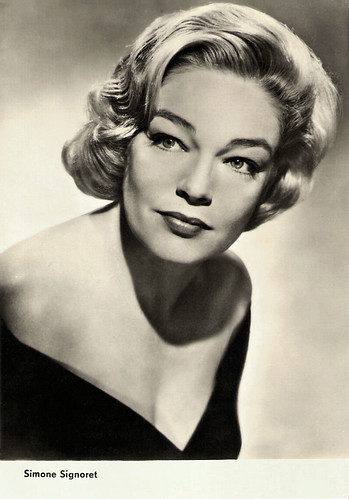
East-German postcard by VEB Progress Film-Vertrieb, Berlin, no. 1412.
Through the years, Simone Signoret matured into a plump but still bewitching character actress. She was never concerned with glamour, ignored the insults about her gaining weight and letting her looks go, and continued giving finely etched performances.
Her later films include the thriller Compartiment tueurs/The Sleeping Car Murders (Costa Gravas, 1965), the war drama L'armée des ombres/Army of the Shadows (Jean-Pierre Melville, 1969) with Lino Ventura, and the crime drama La chair de l'orchidée/The Flesh of the Orchid (Patrice Chéreau, 1975) starring Charlotte Rampling.
In La vie devant soi/Madame Rosa (Moshe Mizrahi, 1977) she played a Jewish, retired prostitute and Auschwitz survivor, who is now a foster mom to children of other prostitutes in Paris' Arab community. This beautiful drama was awarded with the Academy Award for the Best Non-English Film.
Her final film was L'étoile du Nord/The North Star (Pierre Granier-Deferre, 1982) a thriller about a mysterious psychopath with Michel Piccoli. Simone Signoret also wrote books, such as the witty, melancholy memoir La nostalgie n'est plus ce qu'elle était/Nostalgia Isn't What It Used To Be (1978) and Adieu Volodya/Adieu Volodia, a novel about a group of Jewish immigrants from Ukraine and Russia and their children, working in the theatre and film industry in Paris during the years 1926-1945. This novel was published in 1985, the year of her death.
A lifelong chain smoker, Simone Signoret died of pancreatic cancer in Auteuil-Anthouillet, France. Her daughter, Catherine Allégret, and grandson, Benjamin Castaldi, are also actors. At Films de France, James Travers concludes his bio thus: "Today, Simone Signoret is fondly remembered as one of French cinema’s most talented performers, a generous and greatly loved individual whose incisive portrayals of complex women showed not just the allure of her sex, but also that resilience and generosity of spirit that is uniquely feminine".
Opening scene from La Ronde/Round (1950). Source: classicmovieslibrary (You Tube).
Trailer for Les diaboliques/Diabolique (1955). Source: The Criterion Collection (You Tube).
Trailer for L'armée des ombres/Army of the Shadows (1969). Source: Movies Trailers (You Tube).
Sources: James Travers (Films de France), Philip Kemp (Film Reference), Hal Erickson (AllMovie), Dale O'Connor (IMDb), IMDb and Wikipedia.

French postcard by Editions P.I., Paris, no. 195. Publicity card for Les carbones Korès. Photo: Sam Lévin.

French postcard by Editions du Globe, Paris. Photo: Studio Harcourt.

Vintage postcard. Photo: publicity still for Ombre et lumière/Shadow and Light (Henri Calef, 1951).

Mexican postcard, no. 291. Photo: Sam Lévin.
Unlucky-in-love
Simone Signoret was born Simone Henriette Charlotte Kaminker in Wiesbaden, Germany, in 1921. Her father, André Kaminker, a pioneering interpreter who worked in the League of Nations, was a French-born Jewish army officer of Polish descent, who brought the family to Neuilly-sur-Seine on the outskirts of Paris. He and his French wife Georgette Kaminker-Signoret, had also two younger sons, Alain and Jean-Pierre.
Simone grew up in Paris in an intellectual atmosphere and studied the English language in school, earning a teaching certificate. She tutored English and Latin and worked part-time as a typist for a French collaborationist newspaper, Les nouveaux temps, run by Jean Luchaire.
During the German occupation of France, Signoret mixed with an artistic group of writers and actors who met at a cafe in the Saint-Germain-des-Prés quarter, Café de Flore. By this time, she had developed an interest in acting and was encouraged by her friends, including her lover, Daniel Gélin, to follow her ambition.
In 1942, she began appearing in bit parts, making her film debut in Le Prince charmant/Prince Charming (Jean Boyer, 1942). She was working without an official permit during the Nazi occupation of France, because her patriotic father, who had fled to England in 1940 to join General De Gaulle there, was Jewish.
Working almost all the time, she was able to earn enough money to support her mother and two brothers. For the cinema she took her mother's maiden name, Signoret, to help hide her Jewish roots for the Nazi authorities. She had a long film apprenticeship during World War II, mostly as an extra and occasionally getting to speak a single line.
Through the auspices of her first husband, director Yves Allégret, Signoret was given the ‘star build-up’ in the postwar years. Her husband directed her in Dédée d'Anvers/Woman of Antwerp (Yves Allégret, 1948), as Dédée, a prostitute who finds true love. In 1949 she left her husband for actor-singer Yves Montand, whom she married in 1951 and with whom she lived until her death.

French postcard by Editions O.P., no. 19. Photo: Studio Harcourt.

German postcard by VEB Progress Film-Vertrieb, Berlin, no. 820.

French postcard by Editions O.P., Paris, no. 19. Photo: Studio Harcourt.

German collectors card by Greiling Sammelbilder in the series Filmstars der Welt, 2. Band, Serie E, no. 97. Photo: Allianz Film. Publicity still for Manèges/The Cheat (Yves Allégret, 1950).

Vintage collectors card, no. A 55. Photo: publicity still for Manèges/The Cheat (Yves Allégret, 1950).
Yves Montand
"The young Simone Signoret radiated beauty and a ripe sensuality which glowed tangibly from the screen", writes Philip Kemp at Film Reference: "She moved with the indolent languor of a woman supremely confident in her own powers of attraction; the slow, sleepy smile and the heavy-lidded eyes irresistibly evoked thoughts of warm bedrooms and summer meadows. Inevitably, she was cast time and again as a prostitute, a profession amply represented in the postwar French cinema."
An example is her role opposite Gérard Philipe in La Ronde/Round (Max Ophüls, 1950), a film which was banned briefly in New York as immoral. One of the best of her unlucky-in-love characterisations was as the title figure in Casque d'or/Golden Helmet (Jacques Becker, 1952), for which she won a BAFTA Film Award.
Other notable French films in which Signoret appeared during the 1950s are the Emile Zola adaptation Thérèse Raquin/The Adulteress (Marcel Carné, 1953) with Raf Vallone, Le mort en ce jardin/Death in the Garden (Luis Buñuel, 1956) with Charles Vanel, and Les Sorcières de Salem/The Witches of Salem (Raymond Rouleau, 1956) based on Arthur Miller's play.
A Signoret film that is shown often on TV is the thriller Les diaboliques/Diabolique (Henri-Georges Clouzot, 1955) with Véra Clouzot and Paul Meurisse. The chilly character Signoret plays was proof of her immense acting ability.
Philip Kemp at Film Reference: "As a murderess, she could be both credible and sympathetic: as one of Zola's pair of guilt-ridden lovers in Thérèse Raquin, or as the seemingly vulnerable yet scheming blond bomb-shell accomplice in the homicidal labyrinth of Clouzot's Les Diaboliques, the role that cemented her international renown and became an archetype thereafter in imitation upon ripoff of the Boileau-Narcejac thriller, including three remakes with Tuesday Weld, Kate Vernon, and, most recently, Sharon Stone filling Signoret's shoes."
Hollywood beckoned throughout the 1950s, but both Signoret and Yves Montand, were refused visas to enter the United States. Their progressive political activities did not sit well with the McCarthy-era mentality in the US at the time.
Her breakthrough to international stardom came at the age of 38 with the British film Room at the Top (Jack Clayton, 1959) opposite Laurence Harvey. She won an Academy Award for her portrayal of Alice Aisgill, an unhappily married woman who hopes she has found true love. She radiated real warmth in all of her scenes.
Later she played in England again opposite Laurence Olivier in Term of Trial (Peter Glenville, 1962), and in America with Vivien Leigh in Ship of Fools (Stanley Kramer, 1965), which earned her another Oscar nomination.

East-German postcard by VEB Progress Film-Vertrieb, no. 1924. Photo: publicity still for Thérèse Raquin/The Adultress (Marcel Carné, 1953).

East-German postcard by VEB Progress Film-Vertrieb, Berlin, no. 1925. Retail price: 0,20 DM. Photo: publicity still for Thérèse Raquin/The Adultress (Marcel Carné, 1953) with Raf Vallone.

East-German postcard by VEB Progress Film-Vertrieb, Berlin, no. 147. Photo: Gerhard Puhlmann. Simone Signoret then played in the coproduction of Films Borderie, Paris, and DEFA, Berlin, Les sorcières de Salem/The Witches of Salem (Raymond Rouleau, 1956).

Russian postcard, 1961. Retail price: 8 Kop.

East-German postcard by VEB Progress Film-Vertrieb, Berlin, no. 1412.
Plump but still Bewitching
Through the years, Simone Signoret matured into a plump but still bewitching character actress. She was never concerned with glamour, ignored the insults about her gaining weight and letting her looks go, and continued giving finely etched performances.
Her later films include the thriller Compartiment tueurs/The Sleeping Car Murders (Costa Gravas, 1965), the war drama L'armée des ombres/Army of the Shadows (Jean-Pierre Melville, 1969) with Lino Ventura, and the crime drama La chair de l'orchidée/The Flesh of the Orchid (Patrice Chéreau, 1975) starring Charlotte Rampling.
In La vie devant soi/Madame Rosa (Moshe Mizrahi, 1977) she played a Jewish, retired prostitute and Auschwitz survivor, who is now a foster mom to children of other prostitutes in Paris' Arab community. This beautiful drama was awarded with the Academy Award for the Best Non-English Film.
Her final film was L'étoile du Nord/The North Star (Pierre Granier-Deferre, 1982) a thriller about a mysterious psychopath with Michel Piccoli. Simone Signoret also wrote books, such as the witty, melancholy memoir La nostalgie n'est plus ce qu'elle était/Nostalgia Isn't What It Used To Be (1978) and Adieu Volodya/Adieu Volodia, a novel about a group of Jewish immigrants from Ukraine and Russia and their children, working in the theatre and film industry in Paris during the years 1926-1945. This novel was published in 1985, the year of her death.
A lifelong chain smoker, Simone Signoret died of pancreatic cancer in Auteuil-Anthouillet, France. Her daughter, Catherine Allégret, and grandson, Benjamin Castaldi, are also actors. At Films de France, James Travers concludes his bio thus: "Today, Simone Signoret is fondly remembered as one of French cinema’s most talented performers, a generous and greatly loved individual whose incisive portrayals of complex women showed not just the allure of her sex, but also that resilience and generosity of spirit that is uniquely feminine".
Opening scene from La Ronde/Round (1950). Source: classicmovieslibrary (You Tube).
Trailer for Les diaboliques/Diabolique (1955). Source: The Criterion Collection (You Tube).
Trailer for L'armée des ombres/Army of the Shadows (1969). Source: Movies Trailers (You Tube).
Sources: James Travers (Films de France), Philip Kemp (Film Reference), Hal Erickson (AllMovie), Dale O'Connor (IMDb), IMDb and Wikipedia.
18 comments:
So adorable. I love it! Thanks for sharing
Simone Signoret is gorgeous! I like her postcards. Film stars aren't pretty anymore (at least not in America). They all look like underfed refugees with a filthy mouth to match.
Your blog is nice too. Thanks for visiting mine! Sending a friendly wave from southeast Georgia USA ~ Sparky
WOW!!! She is so gorgeous! Thanks for sharing.
Debby
She is sooo beautiful and has such great charisma! Thanks for introducing her to me!
Happy PFF!
I remember her in Room at the Top. Sad she died when she did, she was such a great actress.
Howdy Bob
What a beautiful woman .
She is gorgeous and glamorous
the way stars use to be .
Too often today
It seems everyone wants to starve themselves and loose their
own identity for someone elses.
Such a pity .
I love the way you provide so much background information .
I always get curious and want to read more and of course I now have a new long list of films to see.
Thank you so much for this .
Such an unexpected treat.
Happy Postcard Friendship Friday
Have a wonderful weekend.
Happy Trails
Oh she was such a sexy lady, even when she was 'older' .. Happy PFF!
Diabolique is definitely among my favorites, and there have been some English-language remakes that haven't held a candle to the original. Thanks for posting the trailer!
she looks simply stellar.
What a fascinating blog you have! I got so sidetracked by earlier entries, I lost track of the time. Thank you for all the interesting information, pictures and films.
Happy PFF!
Bewitching is the perfect word to describe her! It strange how brainwashed Americans are against Communism.We are truly schooled to have a gut and almost violent reaction against it.. I so enjoy living abroad so that I could escape that mentality. I'm am utterly fascinated by the very popular communist newspaper here l'Humanité. It's nice to be able to think and read what I want without pre judgment.Happy PFF:) Fascinating post as ALWAYS!
She was a beautiful woman. And so talented. Thanks for the post. Happy PFF!
I remember Simones movies. The information about her life was interesting. Thanks for stopping by my blog.
Judy
What lovely postcards. You give such a good story of the people, too - I like that. Thanks so much.
Kristin
She is stunning.. those eyes! And great information. Thanks for another great post. Happy PFF and Saturday :)
HI Bob of Holland! Your postcards are wonderful, as is the information you provide in your post! Bravo!! Thank you for stopping by my site, and especially for taking the time to leave such a kind comment... I'm really enjoying the Postcard Fridays! All my best, Kathy
Hi PFF'ers, Thank you all for stopping by. Hope to meet you again next friday. I am preparing something for you about a very special comedian. French of course. Au revoir.
Gorgeous and beautiful !!!
Post a Comment